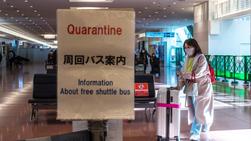 A passenger walks with her suitcase at the arrivals hall at Tokyo's Haneda International Airport on Feb 18, 2022, after Japan's government announced plans to ease virus border rules for workers and students. (PHILIP FONG / AFP)
A passenger walks with her suitcase at the arrivals hall at Tokyo's Haneda International Airport on Feb 18, 2022, after Japan's government announced plans to ease virus border rules for workers and students. (PHILIP FONG / AFP)
SEOUL / TOKYO / BAKU / SINGAPORE / HANOI / YANGON / PHNOM PENH / KUALA LUMPUR / CANBERRA / WELLINGTON / ISLAMABAD / MUMBAI - Japan on Wednesday doubled its cap on daily arrivals from oversees to 20,000 and eased its formally stringent COVID-19 tests and quarantine periods as the country looks to fully reopen its borders.
As concerns about COVID-19 recede, in-bound travelers from 98 countries and regions designated as "blue", meaning they present the lowest risk of infection, including the United States, Britain, China, South Korea, Indonesia and Thailand, are not required to isolate or submit to COVID-19 testing upon entry.
There are two other designated groups, "yellow", which comprises those from 99 countries and regions including Vietnam, India and Brunei, who also do not have to go through testing or isolation provided they have completed three rounds of designated COVID vaccinations.
And people arriving from the "red" group, which includes Pakistan, Fiji, Albania and Sierra Leone will still be subjected to the former COVID-19 protocols.
Japan plans to resume accepting foreign tourists in stages starting June 10, following the latest easing measures announced Wednesday.
"We would like to continue easing border control measures in steps while balancing infection prevention and social economic activities," Japan's top government spokesperson Chief Cabinet Secretary Hirokazu Matsuno told a press briefing on the matter.
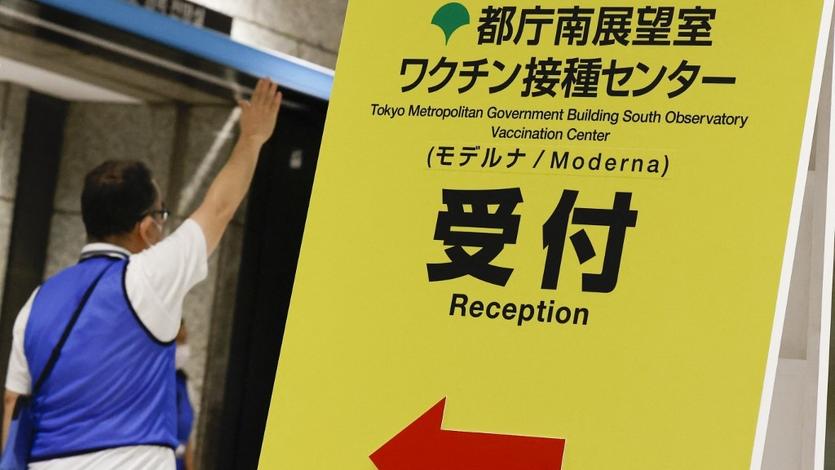 A signboard is displayed during a Moderna coronavirus vaccination campaign at the Tokyo Metropolitan Government building in Tokyo on June 25, 2021. (RODRIGO REYES MARIN / POOL / AFP)
A signboard is displayed during a Moderna coronavirus vaccination campaign at the Tokyo Metropolitan Government building in Tokyo on June 25, 2021. (RODRIGO REYES MARIN / POOL / AFP)
In another development, a study in Japan found that women were significantly more likely than men to develop rash-like side effects after a first dose of Moderna Inc's COVID-19 vaccine.
The study of 5,893 participants between May and November last year showed that 22.4 percent of women developed delayed skin reactions after the first shot, compared to 5.1 percent of men.
The symptoms were mild and not considered a contraindication of the mRNA-based vaccine, according to the June 1 report in the Journal of the American Medical Association.
Delayed skin reactions, happening on or after six days from the shot, have been also reported as a rare adverse event in the United States and Europe, according to the authors from Tokyo's Self-Defense Forces Central Hospital.
But the incidences appear to be higher in Japan, they wrote, perhaps because of a higher awareness of such symptoms in the country. The greater likelihood among women may be due to differences in weight as well as hormonal and environmental factors, they said.
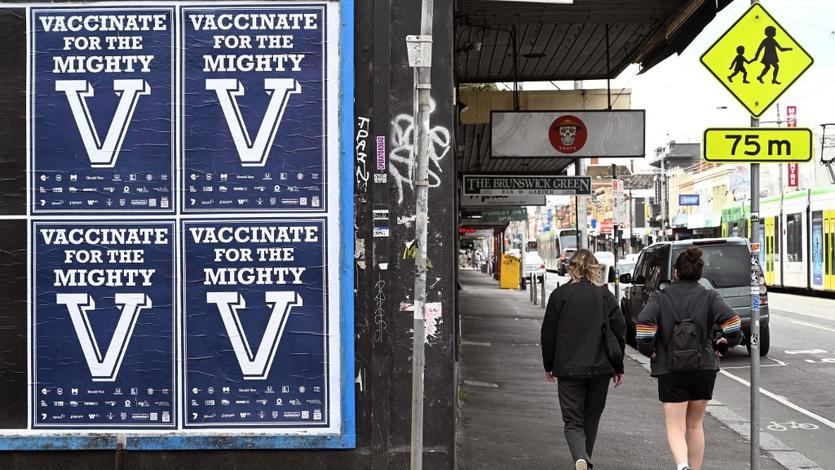 People walk past a sign encouraging people to get vaccinated in Melbourne on Aug 31, 2021. (WILLIAM WEST / AFP)
People walk past a sign encouraging people to get vaccinated in Melbourne on Aug 31, 2021. (WILLIAM WEST / AFP)
Australia
Influenza cases in South Australia (SA) have spiked, prompting concerns about pressure on the hospital system.
According to data released by SA Health on Wednesday, the number of confirmed flu cases in the state surged by 673 to 1,868 in the past seven days.
It comes as health authorities warn that a spike in flu and COVID-19 cases could put severe pressure on the health system.
Chris Picton, SA's health minister, urged everyone to take up free flu vaccines and "do their bit" to save lives.
"This is a concern as our hospitals and hardworking staff manage both COVID and flu cases, and normal winter demand," he told News Corp Australia.
The Guardian Australia on Thursday published data revealing the number of workers who took sick leave in the first half of May was 50 percent higher than the long-term average.
Karen Price, president of the Royal Australian College of General Practitioners (RACGP), said levels of illness in the community were unusually high.
"We've got a larger proportion of the population who have not been exposed to viruses much in the last two years, other than COVID, of which there is still high community transmission," she said.
Australia on Thursday reported more than 30,000 new COVID-19 cases and more than 40 deaths, according to the health department figures from states and territories
 A medical worker displays China's Sinovac COVID-19 vaccine before the vaccination at a hospital in Baku, Azerbaijan, Jan 18, 2021. (TOFIK BABAYEV / XINHUA)
A medical worker displays China's Sinovac COVID-19 vaccine before the vaccination at a hospital in Baku, Azerbaijan, Jan 18, 2021. (TOFIK BABAYEV / XINHUA)
Azerbaijan
Azerbaijan on Wednesday reported 11 new COVID-19 cases, taking its total to 792,778, according to the country's task force under the Cabinet of Ministers on COVID-19 prevention and control.
Data from the task force showed that 10 more patients had recovered in the past 24 hours, taking the total number of recoveries to 783,017.
No people was reported to have died due to the coronavirus in the past 24 hours.
The country has seen a steady decline in daily cases and death rate since March 2022.
 A boy receives a dose of the Sinovac coronavirus vaccine at a health center in Phnom Penh on Nov 1, 2021, as Cambodia begins vaccinating children from aged five and older. (TANG CHHIN SOTHY / AFP)
A boy receives a dose of the Sinovac coronavirus vaccine at a health center in Phnom Penh on Nov 1, 2021, as Cambodia begins vaccinating children from aged five and older. (TANG CHHIN SOTHY / AFP)
Cambodia
Cambodia and China on Wednesday signed a Memorandum of Understanding on the construction of a COVID-19 vaccine filling and packaging factory in Cambodia.
The MoU was inked by Cambodian Health Minister Mam Bunheng and Gao Qiang, general manager of Sinovac Life Sciences Co, Ltd. via video link.
Under the deal, the Cambodia Pharmaceutical Enterprise is given rights to build a COVID-19 vaccine filling and packaging factory and the Cambodian government has contracted to purchase the vaccines from the factory for three years from 2024 to 2026, Bunheng said.
"The construction of the vaccine filling and packaging factory is to meet the demand of vaccines among Cambodians and foreigners living in Cambodia," he said at the event.
Cambodia has so far administered COVID-19 vaccines to over 15 million people, or 94 percent of its total population of 16 million, the Ministry of Health said, adding that China's Sinovac and Sinopharm vaccines have been widely used in the kingdom's immunization program.
Buoyed by its high vaccination rates, Cambodia has resumed all socioeconomic activities and reopened its borders to fully vaccinated travelers without quarantine since last November.
According to the Ministry of Health, the southeast Asian nation has reported no new cases of COVID-19 for the last 25 days, and only four active cases remain in the kingdom.
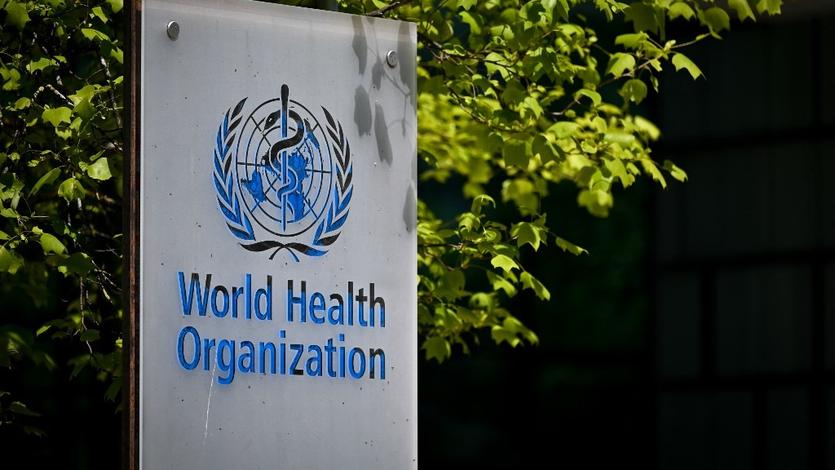 A picture taken on May 8, 2021 shows a sign of the World Health Organization at the entrance of their headquarters in Geneva amid the COVID-19 outbreak. (FABRICE COFFRINI / AFP)
A picture taken on May 8, 2021 shows a sign of the World Health Organization at the entrance of their headquarters in Geneva amid the COVID-19 outbreak. (FABRICE COFFRINI / AFP)
Democratic People's Republic of Korea
The World Health Organization has cast doubts on the Democratic People's Republic of Korea's claims of progress in the fight against a COVID-19 outbreak, saying it believes the situation is getting worse, not better, amid an absence of independent data.
The DPRK's state media has said the COVID-19 wave has abated, after daily numbers of people with fever topped 390,000 about two weeks ago.
"We assume the situation is getting worse, not better," WHO emergencies chief Michael Ryan said during a video briefing Wednesday.
He said the WHO did not have access to any privileged information beyond the numbers publicly reported by state media.
"We have real issues in getting access to the raw data and to the actual situation on the ground," Ryan said, adding that the WHO is working with neighbours like the Repulic of Korea and China to try to get a better picture.
The WHO has offered assistance on multiple occasions, including vaccines and supplies, he said.
The DPRK reported 96,610 more people showing fever amid its nationwide lockdown aimed at containing the impoverished country's first confirmed COVID-19 outbreak, state news agency KCNA said on Thursday.
KCNA said provinces were "intensifying" their anti-epidemic campaigns, including enforcing some lockdowns and coastal blockades, increasing production of drugs and medical supplies, and carrying out disinfection work. Key work such as farming continued, the state media added.
The DPRK's Premier Kim Tok-hun inspected a pair of pharmaceutical factories, amid a push to put the country's drug industry on a "on a new higher level," including meeting international standards, KCNA reported.
"Sufficient production and supply of medicines serve as a prerequisite to protecting the people's lives and health in the current rigorous anti-epidemic campaign," he said.
 A passenger (left) wears a personal protective equipment as she arrives from another state at a railway station in Mumbai on Jan 11, 2022. (SUJIT JAISWAL / AFP)
A passenger (left) wears a personal protective equipment as she arrives from another state at a railway station in Mumbai on Jan 11, 2022. (SUJIT JAISWAL / AFP)
India
India's health ministry reported 3,712 new coronavirus infections for the past twenty four hours on Thursday, the highest in nearly a month, driven up by a record number cases recorded in the financial capital, Mumbai.
The city reported 739 cases on Wednesday night, more than double the number it had recorded just two days earlier, 318.
"Trend graph of Mumbai shows a silent wave, mild omicron variants. Protect vulnerables, keep close watch on hospitalization," Shashank Joshi, a member of the state government task force on COVID-19 said on Twitter late on Wednesday.
Hospitalizations in Mumbai were low, and 96 percent of the cases reported on Wednesday were asymptomatic, the city's civic body said in its daily COVID-19 report.
"There is no rise in hospitalizations. People are quarantining themselves at home and recovering at home. There is no need to worry," state health minister Rajesh Tope told reporters on Wednesday.
Mumbai was one of the first cities to be affected in India's devastating second wave of the pandemic in 2021, but was lauded for its efficient tackling of the crisis.
India has recorded more than 43 million cases and 524,641 deaths since the pandemic began.
 A bus driver sanitizes the interior of a bus before passengers' boarding at Larkin bus station in Johor Bahru, Malaysia, Nov 29, 2021. ( VINCENT THIAN / AP)
A bus driver sanitizes the interior of a bus before passengers' boarding at Larkin bus station in Johor Bahru, Malaysia, Nov 29, 2021. ( VINCENT THIAN / AP)
Malaysia
Malaysia reported 1,809 new COVID-19 infections as of midnight Wednesday, bringing the national total to 4,508,319, according to the health ministry.
There are five new imported cases and 1,804 local transmissions, data released on the ministry's website showed.
Two more deaths have been reported, bringing the death toll to 35,678.
The country reported 4,666 vaccine doses administered on Wednesday alone. Up to 85.7 percent of the population have received at least one dose, 82.9 percent are fully vaccinated and 49.3 percent have received boosters
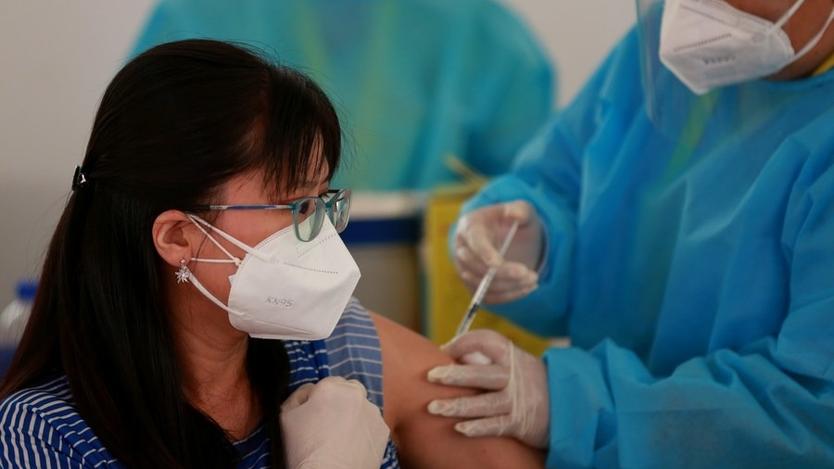 A woman receives a shot of China's Sinopharm COVID-19 vaccine in Yangon, Myanmar, Aug 29, 2021. (PHOTO / XINHUA)
A woman receives a shot of China's Sinopharm COVID-19 vaccine in Yangon, Myanmar, Aug 29, 2021. (PHOTO / XINHUA)
Myanmar
Some 60.2 million doses of COVID-19 vaccines had been administered in Myanmar as of Tuesday, official data showed on Wednesday.
The Health Ministry said more than 26.65 million, or 47 percent of the country's 55 million population, have been vaccinated against COVID-19, and over 2.11 million people have received booster shots as of Tuesday.
Myanmar confirmed 12 new cases of COVID-19 in the past 24 hours, bringing the tally in the country to 613,348 on Wednesday, according to the ministry.
It added that the death toll from COVID-19 in the country remained unchanged at 19,434, as no new deaths were confirmed in the past 24 hours.
New Zealand
New Zealand recorded 7,870 new community cases of COVID-19 and 13 more deaths from the pandemic, the Ministry of Health said on Thursday.
Among the new community infections, 2,456 were reported in the largest city Auckland, the ministry said.
In addition, 95 new cases of COVID-19 were detected at the New Zealand border.
Currently, 393 COVID-19 patients are being treated in New Zealand hospitals, including eight in intensive care units or high dependency units.
Pakistan
Pakistan reported 67 new COVID-19 cases on Wednesday, the country's ministry of health said on Thursday.
The tally of infected people increased to 1,530,520, according to the data released by the ministry.
A total of 30,379 people died from COVID-19 in Pakistan, with no more deaths reported on Wednesday, according to the ministry's statistics.
Republic of Korea
The Republic of Korea reported 9,898 new COVID-19 cases as of midnight Wednesday compared to 24 hours ago, raising the total number of infections to 18,129,313, the health authorities said Thursday.
The daily caseload was down from 15,797 in the previous day, and lower than 18,805 tallied a week earlier, according to the Korea Disease Control and Prevention Agency (KDCA).
Among the new cases, 32 were imported from overseas, lifting the total to 32,897.
The number of infected people who were in a serious condition stood at 176, down 12 from the previous day.
A total of 15 more deaths were confirmed, leaving the death toll at 24,212. The total fatality rate was 0.13 percent.
 A woman walks past signs stating the COVID-19 vaccination requirements for entry into a mall at Raffles Place in Singapore on March 24, 2022.
(ROSLAN RAHMAN / AFP)
A woman walks past signs stating the COVID-19 vaccination requirements for entry into a mall at Raffles Place in Singapore on March 24, 2022.
(ROSLAN RAHMAN / AFP)
Singapore
Singapore reported 3,577 new cases of COVID-19 on Wednesday, bringing the total tally to 1,306,871.
Of the new cases, 366 cases were detected through PCR (polymerase chain reaction) tests and 3,211 through ART (antigen rapid test) tests, according to statistics released by the Ministry of Health.
Of the PCR cases, 348 were local transmissions and 18 were imported cases. Among the ART cases with mild symptoms and assessed to be of low risk, 3,065 were local transmissions and 146 were imported cases.
A total of 327 cases are currently warded in hospitals in the country, with 11 cases in intensive care units.
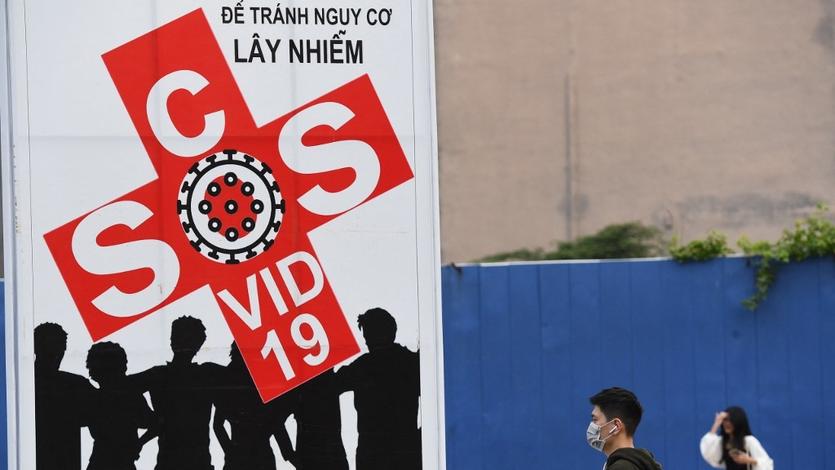 A man passes walks past a billboard on the coronavirus in Ho Chi Minh City on Dec 4, 2021. (NHAC NGUYEN / AFP)
A man passes walks past a billboard on the coronavirus in Ho Chi Minh City on Dec 4, 2021. (NHAC NGUYEN / AFP)
Vietnam
Vietnam recorded 1,047 new COVID-19 cases on Wednesday, up 37 from Tuesday, according to the Ministry of Health.
All the new infections were domestically transmitted in 40 provinces and cities.
The Vietnamese capital Hanoi was the pandemic hotspot with 245 new cases recorded on Wednesday, followed by the northern Yen Bai province with 67 cases and the northern Vinh Phuc province with 61 cases.
The infections brought the total tally to 10,720,426 with 43,079 deaths. Nationwide, as many as 9,471,840 COVID-19 patients, or over 88 percent of the infections, have so far recovered.
Nearly 221.4 million doses of COVID-19 vaccines have been administered in the country, including roughly 199.5 million shots on people aged 18 and above, said the ministry.


